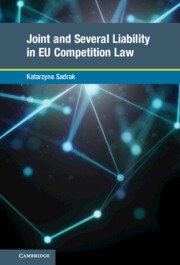Book contents
- Joint and Several Liability in EU Competition Law
- Global Competition Law and Economics Policy
- Joint and Several Liability in EU Competition Law
- Copyright page
- Dedication
- Contents
- Figures
- Table
- Preface
- Acknowledgements
- Table of Cases
- Table of Legislation, Official Papers and Policy Documents
- Abbreviations
- 1 Introduction
- 2 EU Competition Law and Its Impact on Contribution Claims
- 3 Enforcing Contribution Claims under National Laws
- 4 Modifications of Joint and Several Liability with Respect to Certain Groups of Entities
- 5 Liability Sharing Agreements
- 6 Conclusions and Recommendations
- Bibliography
- Index
4 - Modifications of Joint and Several Liability with Respect to Certain Groups of Entities
Published online by Cambridge University Press: 15 September 2022
- Joint and Several Liability in EU Competition Law
- Global Competition Law and Economics Policy
- Joint and Several Liability in EU Competition Law
- Copyright page
- Dedication
- Contents
- Figures
- Table
- Preface
- Acknowledgements
- Table of Cases
- Table of Legislation, Official Papers and Policy Documents
- Abbreviations
- 1 Introduction
- 2 EU Competition Law and Its Impact on Contribution Claims
- 3 Enforcing Contribution Claims under National Laws
- 4 Modifications of Joint and Several Liability with Respect to Certain Groups of Entities
- 5 Liability Sharing Agreements
- 6 Conclusions and Recommendations
- Bibliography
- Index
Summary
Directive 2014/104/EU introduced special rules on joint and several for those engaged in consensual dispute resolution, immunity recipients and small and medium enterprises. The aim of this Chapter is to outline the liability regime for these entities. The assessment starts with the analysis of policy arguments and the search for the logic behind the special rules on joint and several liability. It is asked whether the special treatment of privileged groups is justified and whether the rules provided by Directive 2014/104/EU meet the envisioned aims. Subsequently, the assessment takes a pragmatic angle and it is asked how the special regimes of joint and several liability operate in practice and how they can be improved. The analysis shows that Directive 2014/104/EU insufficiently shields immunity recipients from an extensive private law liability and the rules on joint and several liability call the effectiveness of leniency programmes into question. The Directive’s rules on consensual dispute resolution are also flawed. Given that there is no clear legal benchmark for dividing antitrust liability, the settling parties are virtually unable to determine which settlement offer to make and they can end up overcompensating or being undercompensated.
Keywords
- Type
- Chapter
- Information
- Joint and Several Liability in EU Competition Law , pp. 162 - 206Publisher: Cambridge University PressPrint publication year: 2022



